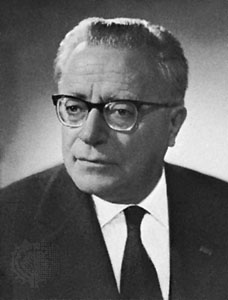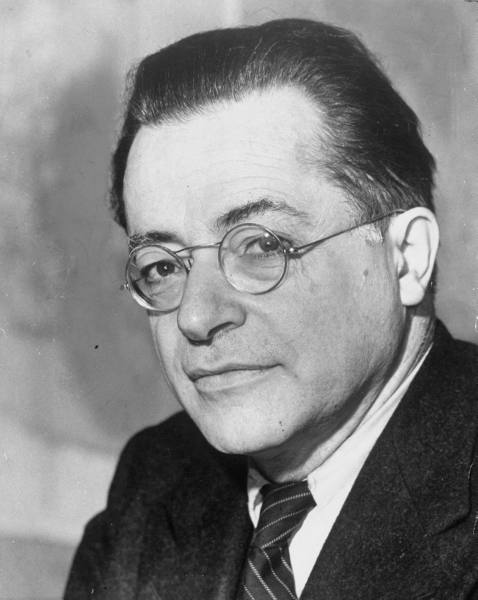<Back to Index>
- Mathematician Adolf Hurwitz, 1859
- Painter Julius Schnorr von Carolsfeld, 1794
- Minister of Justice Palmiro Togliatti, 1893
PAGE SPONSOR


Palmiro Togliatti (26 March 1893 - 21 August 1964) was an Italian politician and leader of the Italian Communist Party from 1927 until his death.
Born in Genoa to a middle class family, Togliatti began his political life in the Italian Socialist Party prior to the First World War. He served as a volunteer officer during the war, and was wounded in action and sent home for illness. Returning at the end of the conflict, he was a part of the group around Antonio Gramsci's L'Ordine Nuovo paper in Turin, while working as a tutor.
He was a
founding member of the Communist Party
of Italy (PCd'I,
later PCI)
and, after Gramsci was jailed by Benito Mussolini's Fascist regime, he became the senior
leader of the PCd'I until his death, for which he also directed Il Comunista. When
the party was banned by the Italian Fascist government in 1926,
Togliatti was one of few leaders not to be arrested, as he was
attending a meeting of the Comintern in Moscow.
In exile during the late 1920s and the 1930s, he organized clandestine
meetings of the PCd'I at Lyon (1926) and Cologne (1931). In 1927 he took the
position of
Secretary of the
party.
In 1935,
under the nom de guerre Ercole Ercoli, he
was named member of the secretariat of the Comintern. In Spain in 1937, during the Civil War,
he willingly contributed to the elimination of anarchists and Trotskyists by the Catalan Communist leaders (carried
out on the orders of Joseph Stalin).
In 1939 he was arrested in France: released, he moved to the Soviet Union and, remained there during World War II,
broadcasting radio messages to Italy, in which he called for resistance
to Nazi Germany and the Italian Social
Republic. He
returned to his native country in 1944 and it was under his direction
that the PCI carried out the svolta
di Salerno, the "Salerno Turn"
— this change in policy was the turn of the party to support of democratic
measures of
reform in Italy (the birth of the
Italian Republic), and the refusal to engage in armed struggle for
the cause of Socialism. In effect, the turn moved the party to the
right, in contrast with many demands from within; it also meant the
disarmament of those members of the Italian
resistance movement that
had been organized by the PCI. Togliatti briefly served as Justice Minister. After
having been minister
without portfolio in
the Pietro Badoglio government, he acted as
vice-premier under Alcide De
Gasperi in 1945.
In opposition with the dominant line in his own party, he voted for the
including of the Lateran Pacts in the Italian
Constitution. At the 1946 general
election, the PCI obtained 19% of the votes and 104 seats.
Communist ministers were evicted during the May 1947 crisis.
The same month, Maurice Thorez,
head of the French
Communist Party (PCF),
was forced to quit Paul Ramadier's
government along with the four other communist ministers. As in Italy,
the PCF was very strong, taking part in the Three parties alliance (Tripartisme)
and scoring 28.6% at the November 1946 elections. In 1948,
Togliatti led the PCI in the first
democratic election after World War II. He lost to the Christian
Democrat party
(DC – Democrazia
Cristiana) after a violent campaign in which the United States,
viewing him as a Cold War enemy, played a large part.
The CIA,
which had just been created, allegedly massively interfered in the
elections. Allied with the PSI in the Popular
Democratic Front,
the left-wing achieved 31% of the votes. Until 1996, the left-wing
coalition was unable to prevail in the national political elections,
while scoring many successes in local administrative elections. The
only tentative to include the PCI in government, under Enrico
Berlinguer's leadership, through the historic
compromise, ended up with Aldo Moro's
1978 assassination. In 2000, the Olive Tree left-of-center coalition
released a report explicitly accusing Washington of having followed a strategy of
tension in Italy
"to prevent the PCI, and in a lesser measure the PSI, of acceding to
power." On
14 July 1948, Togliatti was shot three times, being severely wounded —
his life hung in the balance for days and news about his condition was
uncertain, causing an acute political crisis in Italy (which included a general strike called by the Italian General
Confederation of Labour). Carlo Lucarelli's "Via delle
oche," the final book in his De Luca trilogy, contains a vivid
fictionalized account of that day. Under his
leadership, the PCI became the second largest party in Italy, and the
largest non-ruling communist party in Europe.
Although permanently in the opposition at the national level during
Togliatti's lifetime, the party ran many municipalities and held great
power at the local and regional level in certain areas. In 1953,
he fought against the so-called "cheat or
swindle law", an electoral one voted by the Christian
Democracy-led majority of the time, which aimed at using first past the
post to
augment the center-right's power. Ultimately, the law was to prove of
no use for the government in the elections of that year, which won
Togliatti's PCI 22.6% of the vote; it was repealed in November 1953. Despite
his allegedly tight relationship with
the Soviet
Union, Togliatti's leadership remained unscathed after the 1956 Hungarian
Revolution (which
was everywhere else a cause for major conflicts within the left).
He coined the development of the polycentrism
theory (unity in diversity within the communist parties in all
countries). In the 1958 elections,
the number of Communist votes was still on the rise. In the 1963 elections,
the PCI gained 25.2% of the votes, but again failed to reach a relative
majority. Togliatti
died as a result of cerebral
haemorrhage while
vacationing with his companion Nilde Iotti in Yalta,
then in the Soviet Union. According to some of his collaborators,
Togliatti was travelling to the Soviet Union in order to give his
support to Leonid Brezhnev's
election as Nikita
Khrushchev's successor at the head of the Communist Party
of the Soviet Union. His favourite pupil, Enrico
Berlinguer,
was later elected as his successor to the National Secretary of the PCI
position, though Berlinguer's time in office saw the rejection of some
policies advocated by Togliatti. The Russian city of Stavropol-on-Volga,
where Togliatti had been instrumental in establishing the AutoVAZ (Lada) automobile
manufacturing plant in collaboration with Fiat,
was renamed Tolyatti (as transliterated from
Тольятти, the Russian spelling of his name) in his honor in 1964, after
his death. Togliatti
has been heavily criticised by many Italian historians for his crimes.
Ever since 1942 - 1943 Togliatti allowed Joseph Stalin to kill the Italian politicians who lived in Russia,
and the prisoners of war, as
proved by the secret papers of the archives of Moscow and by his same letters,
addressed to Vincenzo Bianco. Another reason is that Togliatti supported Tito's
crimes and invasion of Italy,
and didn't condemn the Soviet suppression of the
democratic uprising in Hungary.
His politics have been defined as Machiavellian and cynical in purpose,
aimed mainly at securing the growth of the PCI (and that of Communism
in general). He has been also criticized for his alternate relations
with the maverick Yugoslav leader Josip Broz Tito,
which were considered to be closely following the party line dictated from the Kremlin. The
same has been said of Togliatti's judgement of Stalin's policies: after
the communist leader's death in 1953, he had stated that "Joseph
Stalin is a titan of thought and action. His name is to be given to an
entire century...". Later on, in 1956, after the de-Stalinization
process, he had declared that: "Stalin has disseminated false
and exaggerated theses, and was victim of an almost desperate
perspective of endless persecution". In
the following year, Togliatti repeatedly stated that he had been
unaware of Stalin's crimes. The "Italian road to Socialism" he
propounded from that moment moved the Italian Communist Party to more
democratic and independent positions, which would lead to events such
as the PCI's condemnation of the Soviet invasion
of Czechoslovakia in
a famous speech given by Enrico Berlinguer in Moscow. Despite
such contradictions, Togliatti is considered by some politicians as one
among the creators of Republican Italy and of its Constitution.